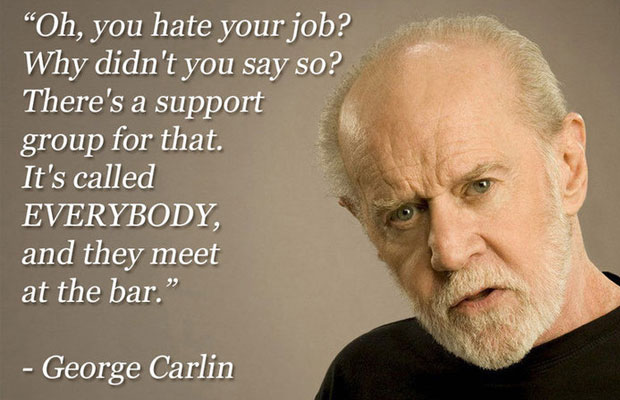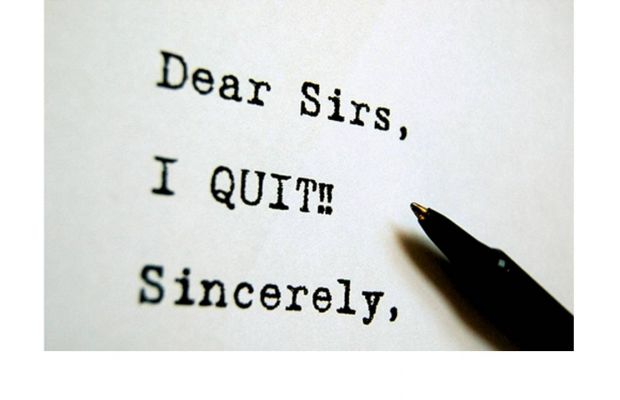Quitting your job is one of the most stressful decisions you can make. We spend forty hours (okay, probably more) at our jobs every week, and many of us define ourselves by our careers. When you meet someone new, what’s the first question that comes up? “What do you do?” In addition to the personal cost, there’s the financial cost. What if you don’t have something else lined up? Can you afford to take a pay cut?
It is a hard thing to remember, but life is far too short to spend time doing work that you don’t enjoy. If you start to feel dissatisfied at work, and it doesn’t blow over in a few days, it usually just eats at you and eats at you until you can’t take it anymore. Very quickly, you find yourself struggling to get out of bed in the morning and suffering through the nagging distress of living a life you don’t enjoy. The fact of the matter is that you rarely hear of someone quitting their job too soon, but the cubicles of America are packed with people who wish they had left that dead-end job earlier. For those of you who are on the fence about whether or not to pull the trigger on that letter of resignation, we’re here to help. Here are 10 Signs It’s Time to Quit Your Job.

10. The Workplace is Always Stressful
There are myriad ways that the office can come to feel like a war zone. The company could be headed for bankruptcy or the drive to continue posting huge profits could be driving everyone’s blood pressure through the roof. You could be in a dying industry or the firm could be coping with unexpected growth in a nascent market. It doesn’t matter why you find yourself in a tense work environment; what matters is that you are spending half of your day with your smiley face stress ball locked in a death grip. Of course, your first steps should be yoga, breathing exercises, listening to sea sounds and the like, but there are some workplaces that are going to make you feel terrible even if you have found your center. Take stress very seriously. Remember, the extreme result of workplace stress if clenching yourself into an early grave. Namaste.
9. It’s Too Easy
It isn’t necessarily a good thing if your job is a breeze. If you have mastered your job to the point that you can do it in your sleep, then it might be time to wake yourself up. Developing yourself requires new challenges, and if work isn’t providing you with new mountains to climb and hurdles to jump, it might be time to seek new opportunities. Comfort is extremely appealing and there are few things in life that feel better than being valued in the workplace, but, if the work is too easy, you probably aren’t getting better. Seeking out new challenges can be incredibly intimidating, because you are choosing to leave something you know well for the great unknown. The odds are that you’ll be happier once you strike out on new adventures because life is incredibly dull if you’re not pushing yourself.
8. This Job’s Not Going to Get You Where You Want to Go
Pretty much every piece of career advice we’ve ever come across recommends you develop a five-year plan. We hear about them constantly, but how many of us actually have one? Where do you see yourself in five years? Is this job going to get you there? These are big scary questions to contemplate, and many of us would sooner turn on Game of Thrones and pop a beer when we get home than consider where we are going in life. Of course, you have to remember that if you don’t think about where you’re going, you’re never going to get there.
At every job you’re going to have, you’ll see people take promotions that take them further away from what they want to be doing. Actresses who tire of waiting tables take restaurant management jobs. Phenomenal salesmen take a pay cut to climb the corporate ladder, leaving behind commission for salary. Teachers move into administration for that tasty pay bump. There is nothing wrong with taking a promotion or working a job that is more the best available option than the best fit, but be aware of the costs versus the benefits. More money usually means spending more time at the office. More time at the office usually means less time to work toward your goals. Nothing comes without a price.
7. You Aren’t Learning
Even at your dream job, you should be developing skills. It’s funny, but we often stay in a job because of what we think we should be getting out of it, as opposed to what we are actually doing. There are some environments where being a personal assistant or working in the mail room will give you access to the power brokers who might get you a job someday. There are other situations where the only thing that working in the mail room is going to get you is a job as mail room manager. Take stock of what you are getting out of your job every few months and make sure that you are getting what you thought you signed up for. If you aren’t doing exactly what you want to be doing, you should at least be able to point to some skills you are developing that are getting you where you want to be. If you are physically near what you want to be doing, but the opportunities for development aren’t there, it might be time to look for greener pastures.



6. You Have Trouble Getting Out of Bed
Simple physical cues are often the easiest way to tell that you’re time at a job should come to an end. If you find yourself lying in bed until the last possible minute, rolling into the office late, taking an early lunch, and staring at the clock as it ticks toward five, then something is wrong. These initial feelings can progress and you might quickly find yourself getting stomachaches and headaches from stress or worry. Sometimes, you might find yourself sluggish and tired. Before you know it, you might start to see your health deteriorating because of your toxic job. We’re not trying to fill you with fear that your job is going to kill you, we’re simply saying that if you think you’re body is trying to tell you something, it might be a good idea to listen.
5. You Think You Might Be One of the Bad Guys
Morality is a complicated thing in the modern world. Companies own companies that their employees don’t even know exist. After a couple years in the workforce, you realize that 30Rock’s joke about the Sheinhardt Wig Company owning NBC isn’t too far fetched. This means that even if you are just a pencil pusher or a mail room boy, your company might be complicit in some messed-up business dealings. How many times have you heard the story of the environmental lawyer who goes to work for an oil company, a principled artist who makes derivative schlock, or a non-profit warrior who is lured away to with a big paycheck from a huge corporation. Sometimes, you have to do things just for a paycheck, but there are also times when you have to stand up for what you believe in and protect your soul. If you wouldn’t feel comfortable telling your friends and family what your company is really up to, then it might be time to seek more righteous, if a little less lucrative, pastures.
4. There’s Nowhere to Go But Out
What are the opportunities for advancement at your job? You might find yourself in a position where you are simply waiting for the guy ahead of you to quit or die, and that’s no place to be. It isn’t just rising to second-in-command that can limit your opportunities. How do the powers that be view you? If they aren’t fans, do you really think that a corner office is in the cards? Look at the people who get promoted. Are they being bumped up from within the company? How long are they expected to work there before they finally get their ticket punched? It is hard to be honest with yourself about advancement opportunities, especially early on in a job. The sooner you can take stock of what your future looks like at a company, the better off you’ll be. The last thing you want is to work your ass off for years only to realize that all they can offer you is a pat on the back and a plaque in honor of your years of dedicated service.
3. You Don’t Believe in the Work
You’ve probably heard (from a college professor or pretentious douche) of the Myth of Sisyphus. Sisyphus was forced to roll a boulder up a hill for eternity, only have it roll back down again before he reached the top. If this sounds more like your everyday life than a metaphor for the futility of existence, then it might be time to get a new career. Of course, jobs like manual labor or retail can often feel numbingly repetitive, but any job can become endless drudgery if you don’t believe in the value of what you’re doing. The best salesmen escape the repetition because they truly believe that they are matching each customer with the best product for them. The best laborers treasure the subtle differences in the ways they ply their trade each day. Even the most elite jobs in business or the arts can feel repetitive if you lose touch with the value of your work. If you don’t believe in the work, it is only a matter of time until you can’t motivate yourself to do it.
2. You Don’t Fit in With the Corporate Culture
Every company has a corporate culture: this is not a concept limited only to hip start-ups that use medicine balls as chairs and install rock walls in the break room. There is an attitude to every company, from the smallest two-man operation to a multi-national corporation. If your company has the profile of Disney and you’re more of a Hamlet, it doesn’t matter how well-suited you are to the work, eventually the environment is going to grate on you. We aren’t saying that you need to quit as soon as you realize that people in the office are different from you, but you have to ask yourself if this is a company that is going to offer the kind of growth and development you need. If you don’t like the way a company feels, how can you aspire to run it one day? Look at the little things. Is this a company that encourages feedback among co-workers? Does your boss value flashy displays over hard work? Are you working in the last stronghold of an old boys’ club when you’d rather be in an office that isn’t musty with the smell or whiskey, cigars, and chauvinism? The little cues can be a big deal, and at the end of the day, where you’re working can be just as important as what you’re doing.



1. You Don’t Like It
You might be snickering in front your computer screen at this one. If you don’t like your job, wouldn’t you just leave? You would think so, but a recent Gallup poll concluded that 71% of people are either “not engaged” or “actively disengaged” at work. Almost three-quarters of the workforce don’t like their jobs. One thing in life that is extremely hard to remember is that if you don’t like your job, you can always leave. No one is forcing you to stay.
Economic circumstances might make your current job the best option avaiable, but savings, night classes, or diving head-first into a hobby can chip away at that bit by bit, and eventually, you can get out of it. Though we live in a free country, leaving a job is often an incredibly difficult proposition. Our job makes us feel safe in an uncertain world. In the U.S., your very well-being is tied to your job. As a result, many workers cling to less than ideal jobs with benefits and 401Ks far longer than they should. The earnings gap between your current job and your dream job might be pretty steep, but sometimes you have to sacrifice a piece of your paycheck for peace of mind. You only go around once and there is no reason to spend that time doing something you don’t like doing … even if the thing you don’t like could help you put a down payment on a nice boat.



Leave a Reply